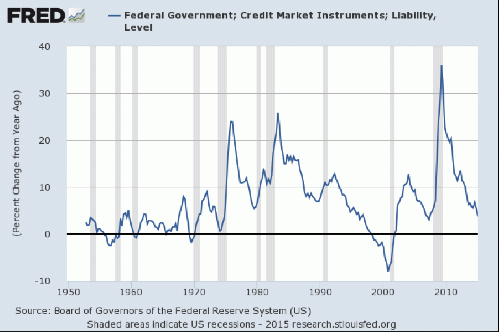| Back OpEd News | |||||||
|
Original Content at https://www.opednews.com/articles/America-Urgently-Needs-an-by-Scott-Baker-Budget_Budget-Bill_Budget-Cuts_Budget-Deficit-151009-593.html (Note: You can view every article as one long page if you sign up as an Advocate Member, or higher). |
|||||||
October 9, 2015
America Urgently Needs an Unbalanced Budget
By Scott Baker
Taking on the Republican establishment - Rep. Vern Buchanan (F-FL16) I wrote a counter editorial that appeared in the Tennessee Cleveland Banner. Here's why balancing the budget is a bad idea and why it leads to recessions, why governemnt spending can be good and promote growth, and how it does not even have to increase the debt.
::::::::
(Originally published in the 9/18/15 Tennessee Cleveland Banner)
Rep. Vern Buchanan (R-FL16) wrote in a Fox News opinion column dated June 27, 2015 that America needs a balanced budget. Interestingly, just about that time, Greece was debating yet another round of austerity-driven cuts in an effort to placate the EU troika of lenders. Austerity measures have not only failed to bring about growth in Greece so far, but have actually been responsible for contracting the economy by more than a quarter since 2009. By any definition, this is worse than a Great Depression, and it shows no let up in sight.
The experience in America, which is more Monetarily Sovereign than the EU countries, though this is still a relative term, practiced stimulating the economy instead. The result is that we climbed out of the Great Recession and continue to grow our GDP and put people back to work, albeit slowly (Greece has over a 25% unemployment rate too).
And this is not the first time. See the following graph.

St. Louis Fed Chart of gov't liabilities during and bewtween recessions
(Image by St. Louis Federal Reserve) Details DMCA
Every recession going back to when record started being kept by the Fed in the 1950s shows that recessions are preceded by reductions in government spending and, more dramatically, are ended by increases in government liabilities (ie spending). This relationship has actually grown more forceful over time, with the largest spending-driven recovery during the 2008-2009 crisis. Interestingly, while we seem to be sputtering a bit lately, with just a .8% growth in GDP in 2014, government spending has dropped way down again. Perhaps we will unspend our way to a recession yet again?
Monetary Sovereignty
Representative Buchanan says that "so-called mandatory spending" will increase the debt and leave little room for things he seems to like better, like so-called national defense -- already the largest item in the discretionary budget and almost as large as the next 10 countries combined -- economic development, which he doesn't define, and peculiarly, veterans' services, which is a relatively small part of the budget and which Republicans like him have consistently fought against increasing.
But this article is not going to be about prioritizing some parts of the budget over others. Readers who are interested in that can try their hand at it by clicking on the link to the New York Times interactive quiz, highlighted in my 2011 Huffington Post article "Honey, I balanced the Federal Budget (And You Can Too)." It's not as hard as it seems to do so.
But is it necessary, or even desirable to do so?
Consider: one of the biggest so-called "entitlements" -- which is really an example of deferred income -- is Social Security. But Social Security is not even an expense if you look at what it returns. How can this be? It is because of something called the Money Multiplier. That is, in the case of Social Security, we get back $1.80 - $2.00 for every dollar we spend on it, according to two independent studies by the AARP and the Southern Rural Development Center.
The Southern Rural Development Center writes:
Similarly, results of an economic impact analysis of OASDI payments at 2009 levels " indicated an output multiplier of about 1.8 in the U.S. economy. As such, every dollar paid in OASDI generated an additional 80 cents in the economy. To put it another way, the $675 billion paid in OASDI benefits during 2009 translated into an economic output of slightly over $1.2 trillion dollars in the U.S. economy.
Read the rest here: srdc.msstate.edu/socialsecurity/files/2011_11_socsecurityimpact.pdf
So, this means that there is a net GAIN for every dollar spent on Social Security and, though this is somewhat controversial, it may be as high as double the input.
I don't know what Representative Buchanan's position on Social Security is, but Republicans in general often look to Social Security as a place to cut spending. But these studies show we would actually lose national income by cutting Social Security. Seniors spend their Social Security check, stimulating the economy, and as long as we don't increase that to the point where they start saving it instead, this will continue to produce a net gain.
Similar savings can be attributed to the next biggest item in the "mandatory spending" (a misnomer too, since Republicans keep trying to cut this) portion of the budget, Medicare. Medicare is cheaper than private insurance, including plans under Obamacare. Medicare for all, with the ability to negotiate lower drug prices would be cheaper still.
But even this is not the big picture. Consider:
The government could simply rip up money it owes itself. Former Representative Ron Paul, and later Representative Alan Grayson, supported a bill a few years ago that would have wiped $2t in national debt that the government owed the Federal Reserve. This was seen as a way of getting back "under" the so-called debt ceiling, but it is actually revenue-neutral because the Fed already returns whatever money it collects on Treasuries minus its own expenses.
And Buchanan's article suffers throughout from the Loanable Funds Fallacy (LFF). LFF states that there is a finite amount of money and that if this is depleted, in the case of the government, no more money can be produced except by raising taxes or borrowing. While this may be true in the case of the states, it is not true for the Federal Government, which is monetarily sovereign under historical precedent, or the Constitution's Coinage Clause (Art. 1, Sec 8, Clause 5), which allows Congress to "coin Money." "Coining Money" need not be potentially inflationary either, if the money is spent on things like infrastructure that create jobs and make commerce more efficient. A very old example of this is the Erie Canal, which lowered freight prices from $114 a ton down to $9 a ton. Many of the infrastructure projects waiting for funding today (is this what Representative Buchanan means by "Economic Development"?) would create similar savings. The oft-repeated mantra that government spending is inherently wasteful is a shibboleth. Wasteful spending is wasteful whether from the private or public sector. Effective investments can come from both places too. And with over 90% of corporate profits going towards stock buybacks and dividends, perhaps Representative Buchanan ought to be looking more closely at his "base" for the true source of waste.
Authors Website: http://newthinking.blogspot.com/
Authors Bio:
Scott Baker is a Managing Editor & The Economics Editor at Opednews, and a former blogger for Huffington Post, Daily Kos, and Global Economic Intersection.
His anthology of updated Opednews articles "America is Not Broke" was published by Tayen Lane Publishing (March, 2015) and may be found here:
http://www.americaisnotbroke.net/
Scott is a former and current President of Common Ground-NY (http://commongroundnyc.org/), a Geoist/Georgist activist group. He has written dozens of articles for Common Ground's national publication, GroundSwell, and has advocated for the Georgist Land Value Tax to public and political audiences.
He is also New York State Coordinator and Senior Advisor for the Public Banking Institute
Scott has appeared on TV/Radio and in in-person Presentations to explain the principles of Georgism, Greenbacking, and State Banking. These may also be found on his personal blog: http://newthinking.blogspot.com/
Scott has a dozen progressive petitions on Change.org which may be found here:
http://chn.ge/10nUAmJ
Scott was an I.T. Manager for a major New York university for over two decades where he earned a Certificate for Frontline Leadership.
He had a video game published in Compute! Magazine: Click Here
Scott is a graduate and adjunct faculty of the Henry George School of Social Science in New York City.
Scott is a modern-day Renaissance Man with interests in economics, science and all future-forward topics.
He has been called an "adept syncretist" by Kirkus Discoveries for his novel, NeitherWorld - a two-volume opus blending Native American myth, archaeological detail, government conspiracy, with a sci-fi flair http://amzn.to/10nUoDV
Scott grew up in New York City and Pennsylvania. He graduated with honors and a Bachelor's degree in Psychology from Pennsylvania State University and was a member of the Psychology honor society PSI CHI.
Today he is an avid bicyclist and ride co-leader in a prominent bike advocacy organization.
Technorati code: a72h4zxgud
